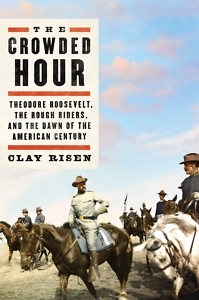In a 1910 speech, Theodore Roosevelt praised the “doer of deeds,” the person who acts rather than sits back and criticizes. “The credit,” the ex-president said, “belongs to the man who is actually in the arena, whose face is marred by dust and sweat and blood; who strives valiantly … so that his place shall never be with those cold and timid souls who neither know victory nor defeat.”
 Roosevelt, one of the most intellectually and physically imposing of America’s presidents, was speaking of more than individual courage. He was advocating for a vigorous, active nation, and he was speaking from experience. As Nashville native Clay Risen beautifully shows in The Crowded Hour: Theodore Roosevelt, the Rough Riders, and the Dawn of the American Century, Roosevelt practiced what he preached and helped lead America into the international arena.
Roosevelt, one of the most intellectually and physically imposing of America’s presidents, was speaking of more than individual courage. He was advocating for a vigorous, active nation, and he was speaking from experience. As Nashville native Clay Risen beautifully shows in The Crowded Hour: Theodore Roosevelt, the Rough Riders, and the Dawn of the American Century, Roosevelt practiced what he preached and helped lead America into the international arena.
Risen’s earlier books include histories of the Civil Rights Act of 1964 (The Bill of the Century) and the assassination of Martin Luther King Jr. (A Nation on Fire). The Crowded Hour portrays Roosevelt’s exploits with the Rough Riders as part of the larger picture of America at the turn of the twentieth century. They were a key element of the Spanish-American War, a brief, victorious campaign in 1898.
“One of the most striking things about war,” Risen writes, “is how it brings into focus a society’s most backward- and forward-looking qualities.” Never were truer words written about the war against Spain. It was, for America, both a deeply moral conflict declared to free the oppressed people in Spain’s colonies and an imperial-style land grab by a previously inward-looking nation.
From his post as assistant secretary of the Navy, Roosevelt was an early advocate for war. He longed to fight, to prove both his mettle and that of his country, which he believed deserved more respect from European powers. When President McKinley finally asked for a declaration of war—pressured by a public enraged by news reports about Spanish atrocities in Cuba—Roosevelt resigned his position and began assembling the First United States Volunteer Cavalry. Although the unit’s commander was Colonel Leonard Wood, it was Lt. Colonel Roosevelt who attracted publicity and recruits. His star power drew men from everywhere, from the Wild West to the Ivy League, to be part of what the press christened the Rough Riders.
“Roosevelt made the Rough Riders” writes Risen, “and the Rough Riders made Roosevelt.” The future governor and president enjoyed every minute of his new job. Being among a regiment of like-minded men was his idea of paradise, the fulfilment of “the strenuous life.” He had little previous military experience but quickly mastered the art of the drill and the arcana of army tactics and logistics. He even delighted in fights with the bureaucrats and generals who failed to plan adequately for the war. The reformer politician helped expose army brass who were so incompetent that the Rough Riders, a cavalry regiment, were sent into battle without their horses.
 In Cuba, Roosevelt proved to be a natural leader and almost recklessly brave. At the famous charge up Kettle Hill during the Battle of San Juan Heights, the colonel led his men from the front. His willingness to expose himself to enemy fire so inspired his troops and so impressed reporters on the scene that by the time the Rough Riders returned to the states as conquerors, Roosevelt could write his own political ticket. He was elected governor of New York within three months and vice president of the United States two years after that, becoming president upon McKinley’s assassination in 1901.
In Cuba, Roosevelt proved to be a natural leader and almost recklessly brave. At the famous charge up Kettle Hill during the Battle of San Juan Heights, the colonel led his men from the front. His willingness to expose himself to enemy fire so inspired his troops and so impressed reporters on the scene that by the time the Rough Riders returned to the states as conquerors, Roosevelt could write his own political ticket. He was elected governor of New York within three months and vice president of the United States two years after that, becoming president upon McKinley’s assassination in 1901.
In The Crowded Hour, Risen gives more than just a rousing retelling of the well-known story of Roosevelt’s Rough Riders. He shows how the famous regiment and their more famous leader helped remake America. The country’s booming economy in the late-nineteenth century gave it the wherewithal to be a world power, but Americans lacked the desire to engage internationally. The war with Spain gave them confidence and helped heal some of the lingering divisions of the Civil War. “Roosevelt’s vision,” notes Risen, “backed by his personal experience and sacrifice in battle, provided a model for the country, and at its best inspired generations of leaders to go beyond personal and national self-interest in the name of the common good.”
But this noble vision would also prove dangerous. It led to the foreign entanglements which George Washington had warned about and which weakened America’s resolve in the latter part of the American Century. Risen notes the ironic fact that the last Rough Rider died in 1975, shortly after the end of the Vietnam War. Such are victory and defeat in the arena.

A Michigan native, Chris Scott is an unrepentant Yankee who arrived in Nashville more than twenty-five years ago and has gradually adapted to Southern ways. He is a geologist by profession and an historian by avocation.



